Welcome to the week. Here are the most noteworthy items our editors and readers came across in the past seven days…
But first, a word from our sponsor…
This week’s Monday Roundup is sponsored by the West End Bikes Anniversary Sale, happening now through March 10th, where you can save 10-50% off the entire store.
Take back our streets: Community leaders in Pittsburgh are turning to streets to create public spaces in neighborhoods where room to roam is at a premium. Should we be doing this in east Portland?
Free car with purchase: A developer in Baltimore is so keen on tenants not owning a car (and needing a place to park) that each new lease comes with a free bike.
Stop routine stops: Strong Towns says if we want to make our streets safer, using cops to do routine traffic stops is the most oppressive, least effective way to do it.
Bikes rule: Uber found that in the Sacramento market, their e-assisted Jump bikes were far more popular for short trips than “getting an Uber”. I have zero doubt the same will prove true when we get e-bike share here in Portland.
Climate first candidate: Washington Governor Jay Inslee is getting a lot of attention not just for throwing his hat in the presidential ring, but for putting climate change front-and-center. I’m sure Milwaukie Mayor Mark Gamba will follow his run closely.
Advertisement
Beto on a bike: The popular Texas politician was spotted casually hoping on a singlespeed bike and it was amazing:
Last night @leylasantiago pulled Beto O'Rourke aside in El Paso, where he told her "I'm going to be making an announcement soon," before riding off into the night on his bicycle: pic.twitter.com/Il2X7Dw6bR
— DJ Judd (@DJJudd) February 28, 2019
Feds dragging feet: The League of American Bicyclists says the federal government has yet to require auto-emergency braking to be included in car safety ratings — even though Congress passed a law requiring it in 2015.
REI cycling: Outdoor retailer juggernaut Recreation Equipment Inc (REI) has announced a new partnership with Cannondale and Bontrager as part of an effort to expand its cycling offerings.
E-scooter hate update: Bicycling says lovers of e-scooters and bicycles should be allies in the larger fight for our streets.
E-bike takeover: Venerable cycling journalist Carlton Reid shares via Forbes that sales of electric bikes have surpassed sales of non-electric bikes in the The Netherlands.
Overthrow the auto-centric regime: This new paper by law professor Gregory H. Shill says America’s legal system subsidizes driving thereby ensuring its continued dominance. Shill argues for, “a teardown of this regime,” and a new system of laws and policies that allow for, “a basic reorientation of relevant law towards consensus social priorities, such as health, prosperity, and equity.”
— Jonathan Maus: (503) 706-8804, @jonathan_maus on Twitter and jonathan@bikeportland.org
Never miss a story. Sign-up for the daily BP Headlines email.
BikePortland needs your support.



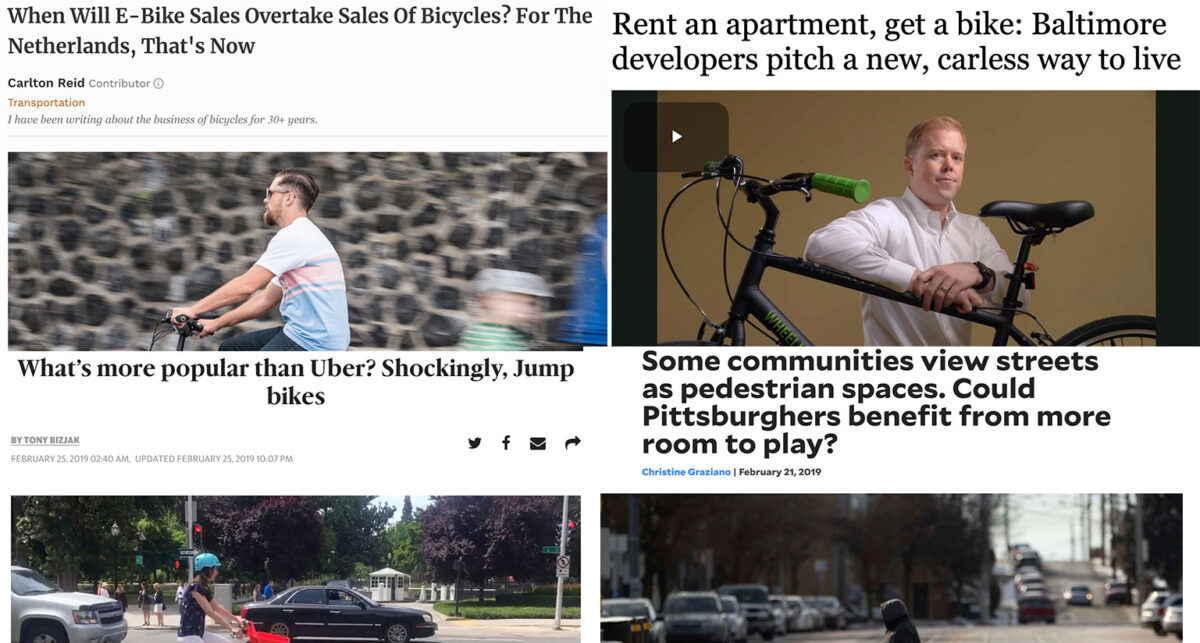
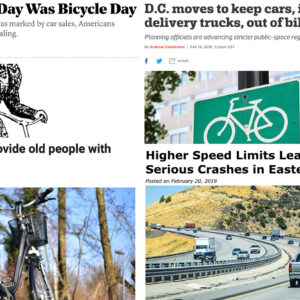
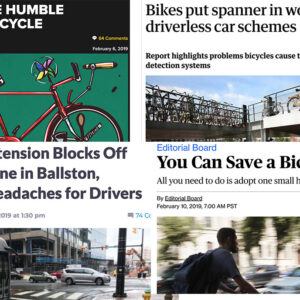
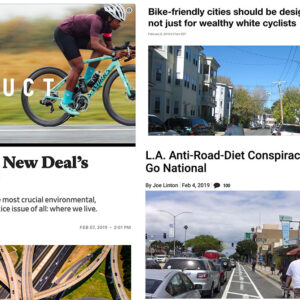
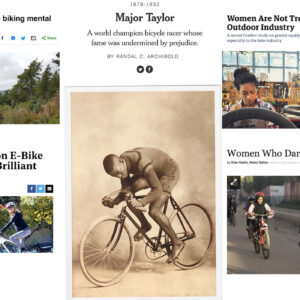
Thanks for reading.
BikePortland has served this community with independent community journalism since 2005. We rely on subscriptions from readers like you to survive. Your financial support is vital in keeping this valuable resource alive and well.
Please subscribe today to strengthen and expand our work.
Re: Baltimore bike incentive,
“That may seem like a big commitment for the fewer than one percent of Baltimore commuters who cycle to work, though it’s been rising,…”
Is it really so hard to recognize that this is a dynamic situation?! That there is NO WAY we can keep putting all our eggs into the auto basket? Because percentages?
E-scooters as natural allies –
“Those worried about climate change, oil dependency, and noise pollution should know that micro-mobility poses a potential solution to all these problems.”
Only if the I stopped driving when bird scooters came to town trope has a basis in fact. Frankly that claim, which is recycled from the ‘survey’ conducted here in Portland in this piece, seems incredibly dubious, and convenient for the boosters.
Let’s first collect some actual data.
The article on the auto-centric nature of laws, and subsidies in our society makes me think of the old Berlin Wall and the only real solution, ” Tear It Down”. Happy motoring is just as oppressive, dark and dangerous as a giant wall dividing people and we did not solve it with tiny windows, wall cross sundays or a half baked bandaids. Lets face up to the dangerous shadow across our land and , “Tear it Down.”
Beto O’Rourke has a Surly fixie to SS conversion without a front brake. Potemkin policy.
Charlie Hales rode an entry level big-brand hybrid for Sunday Parkways. Caretaker mayor.
Earl Blumenauer I can only assume to have a dusty steel Trek hanging in the garage.
Being a white dude who rides a bike means nothing, and neither does political experience. Their seniority is the product of their own self-preservation. These men cannot save us.
I throw a wrench in to the spokes of your political theory. Bud Clark, maybe he could save us.
Might as well just vote for Trump.
What does AOC ride?
Shinola step-thru 3 speed with wicker basket in Red . ( just a guess).
I’ll guess that she rocks a 90’s Specialized Mountain Bike with fenders, rack, slicks, and carries a NY lock. And I’m guessing that she’s in the market for an upgrade.
Whatever it is, I am sure there is a nut loose behind the handlebars.
She just got called out for some pretty big Uber charges. I don’t think riding a bike is in her nature. “Do as I say, not as I do” seems to be her mantra so far.
Now, Now, she may be a bit naive, but she is certainly not “nutty” to search for alternatives to the rotting carcass of late-stage, neoliberal, rentier capitalism. A system that could “outgrow” alternatives when land and energy was cheap and plentiful but is now past its pull date as we head in to an era of planetary limits. I am afraid the upcoming mega-recession will put the last spike in the coffin of Adam Smith’s invisible hand.
Unikely… even totalitarian communist regimes have been unable to tamp down small-scale capitalism. The invisible hand was descriptive, not prescriptive.
the bus.
So far I’ve only seen her on a Citi Bike. She’s made numerous statements supporting more bike lanes.
I read where twenty percent of American car owners are four months or more behind on their car payments. And finance companies aren’t in a big hurry to repo because they’re already up to their you-know-whats in repos. Maybe this American car obsession is beginning to self-correct? Maybe just a little bit?
Happy motoring will not die because people don’t want to drive cars any more, but because people can’t afford to drive cars anymore. The increasing costs of new cars, insurance, fuel, tires, registration, parking, repairs and the shrinking disposable income of the average american due to stagnating wages and ballooning costs will soon drive car ownership (and frequent use) out of reach. People will cling to this outdated and unaffordable habit (personal motoring) until the last car is repo’ed, or molders in the front yard due to lack of gas, or repairs. They will think they are only riding the bus until things get better, but they never will. They will still think of themselves as temporarily inconvenienced motorists and wear their ford hats and BMW golf shirts but it will be over, and eventually they will forget the smelly dangerous beasts that ruled their lives and killed their pets . Life will go on, and the kids will once again play in the street.
I have a friend who’s car fell apart about five years ago and he hasn’t had the spare cash to fix it. He’s only a block from a Skytrain station and works near another station so he started using that. He lives in a city with a great transit system which means he can get to work in twenty minutes zooming quickly above the traffic that he used to be in. He’s doing fine in his life but even after all this time, in his mind he still identifies as a motorist and the fact that he’s taking transit is merely just a temporary thing.
Sounds great and we all hope that in the future we’ll be super rich and then be able to afford lots of stuff.
I suppose he sees owning a car as a sign of success or something. Even after all the unfairness he’s experienced in his life he still believes that the system rewards anyone who just works hard.
I can’t remember the percentage, but as I recall a substantial number of those folks behind on car payments are Millennials. I have to wonder if this isn’t a by-product of our housing failure with an added dash of education debt (that we Boomers didn’t have to take on). When people get pushed out of walkable/bikeable/transit oriented cities into the outer suburbs, it can cause them to fall down the car drain.
Meanwhile, I cringe at my age-peers who are fighting tooth and nail to keep large chunks of Oregon’s cities as single-family residences on suburban-sized lots with severe height restrictions and mandatory off-street parking. I’m on the sidelines rooting for those legislative staffers who are pushing several bills aimed at alleviating some of this low-density disaster.
I’ve never had a car payment, and I don’t understand why (most) other people do. Save for a year, buy a cheap car, and pay up front.
Me too. My first six years in Portland was car free. During that time I slowly saved. I then bought a Toyota Camry for $2800. Once I purchased it, I saved more money knowing that I would have to put money into it for maintenance. Sure enough, a year after purchasing it, I had to put up $1200 for a steering rack. But I budgeted and planned. During this time I made wages from $11-14.50 an hour. Luckily I had low rent in those days, but I still had student loans. It worked because I stayed within my means and I continued to work hard making more money per hour. I still drive that Camry.
I’ve never had one either. However, if a college graduate with the typical $40k in student loans foregoes car ownership and lives in the city core, which many Millennials apparently did, I can see where they find themselves not able to save enough to purchase with cash when they are suddenly booted out of the core and can only afford to live out in the periphery. Take away those loan payments and their problems become significantly less.
Another subgroup that comes to mind were the victims of my father’s business back in the ’90’s. (I found what he was doing so reprehensible that we didn’t speak to each other for nearly a decade.) He made car loans. His typical customer was a woman with children who was reentering the workforce after a recent divorce and bankruptcy. She kind of needed the car to make it all work (sad state of our cities). She was so desperate that she was willing to take a loan at or above credit card interest rates, because no one else would loan to her. To top it off, the dealer, in cahoots with the lender, would charge an extra grand for the trouble of arranging this loan and pass it on to the lender. Even when the car got repossessed for late payments, the lender and dealer made money. Ugh, it is a sickening business model that is truly an “only in America” sort of thing.
Unexpected things happen to people. Sadly, our system and bad breaks can combine to put people into financial death spirals.
>>> Unexpected things happen to people. Sadly, our system and bad breaks can combine to put people into financial death spirals. <<<
This is very true.
” Take away those loan payments and their problems become significantly less.”
I’ve found that many people who don’t have $30K in student loans have $30K in car debt. It’s funny, people complain about a ten year fixed loan at < 7%, but they have no problem purchasing a depreciating asset for the same amount… Although it sounds like the millennials are defaulting on these loans as well…
From the article about “routine traffic stops”:
>>> This is not an uncommon experience for young black men, which Castile was, and is indicative of the way traffic stops are often used in low-income, high-crime communities: as a sort of surveillance tool that allows police to detect other illegal activity. <<<
This describes pretext stops, not traffic enforcement. It is clear (and unsurprising) that using minor traffic offences to stop people who "look suspicious" leads to abuse.
This is different than genuine traffic enforcement.
I agree. They’re not concerned about the traffic infraction but using it as a way to get into the driver’s pockets, under the seat, and a name and DOB for warrant check.
= social class
and by that I don’t mean money, but the complex of priorities which don’t just suggest but necessitate money be spent according to certain prevailing logics.
At the time I bought my first two cars, I was earning very little money, and they were very inexpensive. But I believe class is as much a value and knowledge system as it is an income level, and while I don’t entirely understand what you are saying, it sounds like you agree.
If you are Middle Class, fitting in, securing approval from your (class) peers, demonstrating your bona fides through specific purchasing decisions, may be far more important to you than the kind of fiscally prudent logic you (and many others) might bring to this issue.
That may describe your peer group, but it definitely does not describe mine.
You seem to have misunderstood my point.
I was contrasting your (to me perfectly sensible) reasoning with the idealized Middle Class anxiousness around such things, that at least to me helps explain the otherwise confusing choices many people make.
Are you saying that car loans are a hallmark of people who feel insecure and want to show the world (or their peer group, at least) that they’ve “made it” with displays of wealth that they might not actually have, and that those displays might actually make it more difficult to achieve financial security?
I don’t disagree with that interpretation, especially the first half.